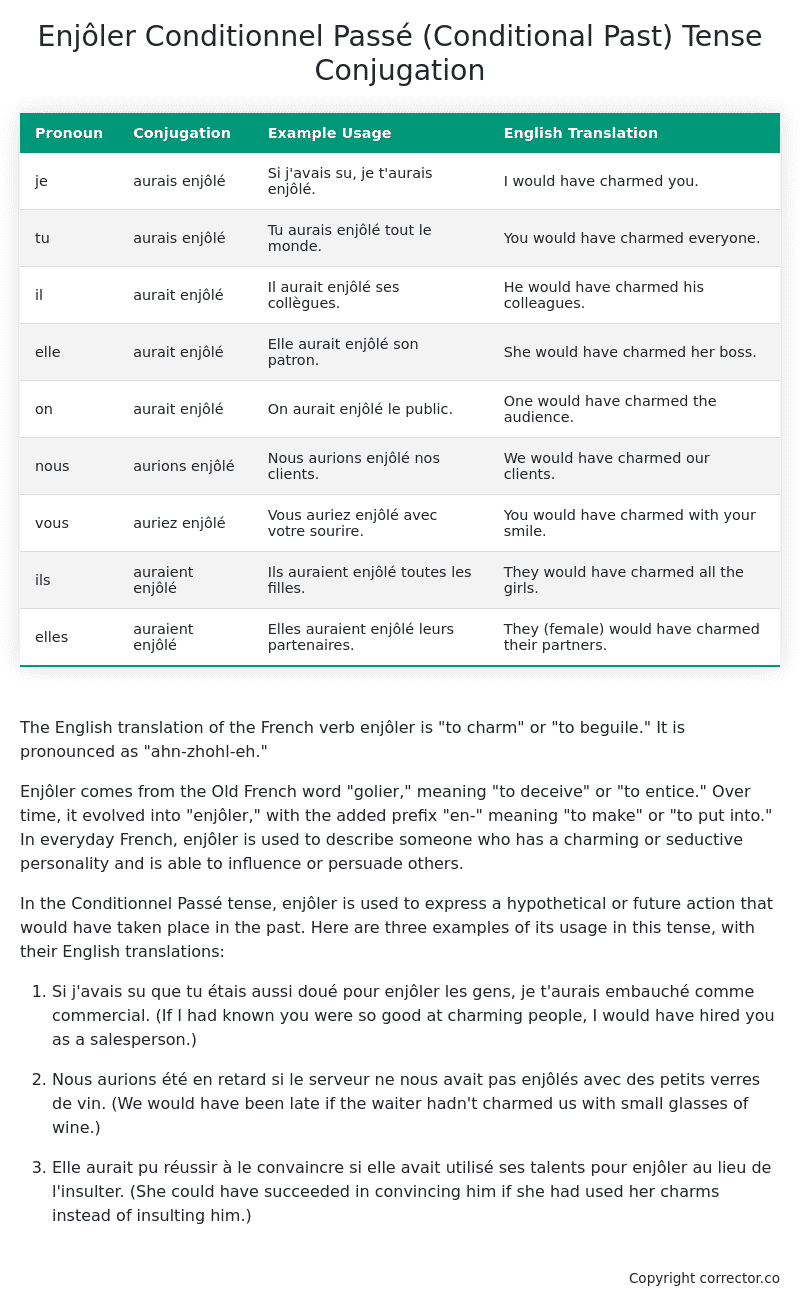Conditionnel Passé (Conditional Past) Tense Conjugation of the French Verb enjôler
Introduction to the verb enjôler
The English translation of the French verb enjôler is “to charm” or “to beguile.” It is pronounced as “ahn-zhohl-eh.”
Enjôler comes from the Old French word “golier,” meaning “to deceive” or “to entice.” Over time, it evolved into “enjôler,” with the added prefix “en-” meaning “to make” or “to put into.” In everyday French, enjôler is used to describe someone who has a charming or seductive personality and is able to influence or persuade others.
In the Conditionnel Passé tense, enjôler is used to express a hypothetical or future action that would have taken place in the past. Here are three examples of its usage in this tense, with their English translations:
-
Si j’avais su que tu étais aussi doué pour enjôler les gens, je t’aurais embauché comme commercial. (If I had known you were so good at charming people, I would have hired you as a salesperson.)
-
Nous aurions été en retard si le serveur ne nous avait pas enjôlés avec des petits verres de vin. (We would have been late if the waiter hadn’t charmed us with small glasses of wine.)
-
Elle aurait pu réussir à le convaincre si elle avait utilisé ses talents pour enjôler au lieu de l’insulter. (She could have succeeded in convincing him if she had used her charms instead of insulting him.)
Table of the Conditionnel Passé (Conditional Past) Tense Conjugation of enjôler
| Pronoun | Conjugation | Example Usage | English Translation |
|---|---|---|---|
| je | aurais enjôlé | Si j’avais su, je t’aurais enjôlé. | I would have charmed you. |
| tu | aurais enjôlé | Tu aurais enjôlé tout le monde. | You would have charmed everyone. |
| il | aurait enjôlé | Il aurait enjôlé ses collègues. | He would have charmed his colleagues. |
| elle | aurait enjôlé | Elle aurait enjôlé son patron. | She would have charmed her boss. |
| on | aurait enjôlé | On aurait enjôlé le public. | One would have charmed the audience. |
| nous | aurions enjôlé | Nous aurions enjôlé nos clients. | We would have charmed our clients. |
| vous | auriez enjôlé | Vous auriez enjôlé avec votre sourire. | You would have charmed with your smile. |
| ils | auraient enjôlé | Ils auraient enjôlé toutes les filles. | They would have charmed all the girls. |
| elles | auraient enjôlé | Elles auraient enjôlé leurs partenaires. | They (female) would have charmed their partners. |
Other Conjugations for Enjôler.
Le Present (Present Tense) Conjugation of the French Verb enjôler
Imparfait (Imperfect) Tense Conjugation of the French Verb enjôler
Passé Simple (Simple Past) Tense Conjugation of the French Verb enjôler
Passé Composé (Present Perfect) Tense Conjugation of the French Verb enjôler
Futur Simple (Simple Future) Tense Conjugation of the French Verb enjôler
Futur Proche (Near Future) Tense Conjugation of the French Verb enjôler
Plus-que-parfait (Pluperfect) Tense Conjugation of the French Verb enjôler
Passé Antérieur (Past Anterior) Tense Conjugation of the French Verb enjôler
Futur Antérieur (Future Anterior) Tense Conjugation of the French Verb enjôler
Subjonctif Présent (Subjunctive Present) Tense Conjugation of the French Verb enjôler
Subjonctif Passé (Subjunctive Past) Tense Conjugation of the French Verb enjôler
Subjonctif Imparfait (Subjunctive Imperfect) Tense Conjugation of the French Verb enjôler
Subjonctif Plus-que-parfait (Subjunctive Pluperfect) Tense Conjugation of the French Verb enjôler
Conditionnel Présent (Conditional Present) Tense Conjugation of the French Verb enjôler
Conditionnel Passé (Conditional Past) Tense Conjugation of the French Verb enjôler (this article)
L’impératif Présent (Imperative Present) Tense Conjugation of the French Verb enjôler
L’infinitif Présent (Infinitive Present) Tense Conjugation of the French Verb enjôler
Struggling with French verbs or the language in general? Why not use our free French Grammar Checker – no registration required!
Get a FREE Download Study Sheet of this Conjugation 🔥
Simply right click the image below, click “save image” and get your free reference for the enjôler Conditionnel Passé tense conjugation!

Enjôler – About the French Conditionnel Passé (Conditional Past) Tense
Formation
Common Everyday Usage Patterns
Expressing Unreal Past Scenarios
Polite Requests or Suggestions
Expressing Doubt or Uncertainty
Interactions with Other Tenses
Conditional Present
Indicative Past Tenses
Conditional Future
Summary
Want More?
I hope you enjoyed this article on the verb enjôler. Still in a learning mood? Check out another TOTALLY random French verb conjugation!


